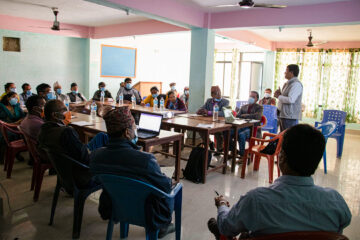
Southasia Institute of Advanced Studies (SIAS) and ForestAction Nepal organized a district-level workshop in Manthali, Ramechhap on the 3rd of April 2021. The main objective of the workshop was to share preliminary findings from ongoing PECA research and get feedback. In addition to 5 researchers from SIAS and ForestAction (FA), there were 32 participants representing CFUGs members of Chyasku (Ramechhap Municipality ward no. 6) and Khimit (Likhu Tamakoshi Rural Municipality ward no 6) villages, Likhu Tamakoshi Rural municipality, Ramechhap municipality, FECOFUN’s Palika level and district representatives, a representative from Divisional Forest Office, and some local NGO representatives.
After a brief introduction session, Dr. Dil Khatri, Executive Director of SIAS, provided an overview of PECA research and explained the workshop objectives. Subsequently, Dr. Dilli P. Poudel, Senior Researcher of SIAS, and Dr. Bishnu Hari Poudel, Senior Researcher of FA, shared the preliminary findings of the study sites, Khimti and Chyasku. The presentations were followed by a short round of Q&A session. Subsequently, in the plenary session, researchers and participants discussed on, changing farm-farmer relation, changing/decreasing use of forest and increasing wildlife problem.
As the damage of crops by wild animals primarily monkey, porcupine, deer has already exceeded farmers’ capacity to control them, which was also researchers’ finding, the participants raised this issue as a compelling factor that casing farmers demotivation on farming. They thoughts that increasing forest coverage and decreasing water sources in the forest are the main two reasons for increasing problem caused by wild animals. While forest official suggested plantation of fruit trees or other multi-purpose trees in the forest, other participants were of the view to somehow control population. Few forest user groups constructed pond in the forest and they share positive results in terms of decrease in the flow of wild animals in farm land. Participants also suggested mechanism to compensate farmers for crop and livestock damage.
Participants discussed about growing issue of deterioriating farming conditions which are the problems of water scarcity (and unpredictable weather), damage of crops by wild animals, and the lack of labor due to youth outmigration are the key drivers of declining farming activities and the increasing trend of land abandonment in the villages. Although the government has implemented different support schemes such as soft-loan, it not only requires collateral but also financial institutions do not accept rural land as collateral. Moreover, politically influential and big landholders are reaping the benefits from this scheme, not the genuine farmers.
Furthermore, participants also pointed to the problem of increasing landslides in the hilly areas due to haphazard road construction, termed as “dozer terrorism”. They suggested bio-engineering measures to stablise slopes and control erosion. Finally, the deputy president of Likhu Tamakoshi Rural Municipality, Ms. Dipshikha Dahal, suggested scaling up the issues related to wildlife, agriculture and forest to the central level debates, and push further to seek their policy solutions. She also admitted that managing these problems should also be a priority of both local and central governments.




